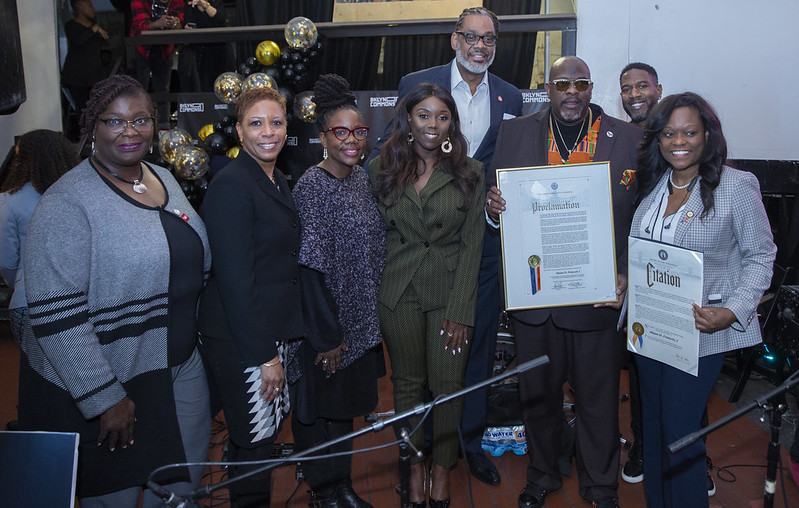
Farah Louis, the author (middle, in green) with Adrienne Adams (second from left) & others (photo: John McCarten/City Council)
While tackling the global COVID-19 pandemic, New York City experienced a historic moment this year. We didn’t just break the proverbial glass ceiling; we demolished barriers that were created to leave marginalized communities out for generations. The next New York City Council is on track to be the most diverse in the city’s history, including the first Muslim woman; the first openly gay Black women; seven foreign-born New Yorkers; the largest LGBTQ+ delegation; and a high number of electeds who identify as people of color. For the first time ever, City Hall will have a majority of 31 women serving in the legislative body.
In our city, from health care to home care, whether managing restaurants or grocery stores, women are leading the way. Women make up the majority of workers on the frontline in the fight against COVID-19, and by supporting the very people who have shown up, risked their lives and, in some cases lost their lives during our darkest hour, we can improve the city. Many of their important issues were sidelined when the covid crisis began, and if the goal of the New York City Council in the next session is to fully reopen and revitalize New York City, and make it better than it was before the pandemic, these issues must take center stage.
There can be no recovery without centering women during our next legislative session – because every issue essentially is a women's issue.
We should begin at the beginning: the maternal mortality and morbidity debacle. Birthing-people in New York City are dying. Their pain is ignored. Their lives, along with the lives of their children, are at risk. The City of New York has not adequately invested in the necessary infrastructure or programs to protect them. Black and Brown mothers, in particular, have endured structural racism in health care for decades. There is a national and local history of substandard care, disregard, disrespect, and unfair treatment.
Black women are two to three times more likely to die from complications during their pregnancy. I witnessed this firsthand in my district. According to a report by the NYC Health Department of Mental Health and Hygiene, East Flatbush is one of three New York City neighborhoods with the highest rate of infant mortality and maternal complications in the city, resulting primarily from racial disparities in health care.
The solutions exist and they are coming from the most knowledgeable advocates, close to the issue: midwives, doulas, and birth advocates. Tackling these issues first will have widespread benefits because health issues that are specific to women’s bodies impact our entire city. Tackling these issues with a co-governance lens will lead to substantial change and a better start for our families.
Supporting women cannot only revolve around the act of birth, of course. We need to invest in mental health resources to deal with postpartum depression, as well as long-term mental health needs for all women. Women are the primary caregiver in most homes, while also working, and living through the harsh realities of pandemic life, as well as other challenges that existed well before COVID-19.
Black and brown communities, in particular, have been disproportionately affected by health disparities, the loss of loved ones, and housing instability. We must ensure that New Yorkers have comprehensive, immediate, culturally competent, and accessible mental health care. Investing in programs that make mental health services accessible to all is a necessary step to reopening New York City fully, and it must begin with the people who did not have access during this crisis.
Our focus cannot purely be on survival; we must push for an agenda that allows women to thrive. Two hindering problems to solve include pay parity and accessible and affordable child care. The pay gap between American men and women is one of the greatest injustices this country has battled for decades. Women across the nation bear the consequences of being paid a fraction of the compensation that their male counterparts are paid — for the same work. For too many Black women, the workplace is yet another arena in which they must wrestle with discrimination and inequality. Our families depend on our livelihoods to remain afloat. These discriminatory pay practices can — and must — change.
This must be supplemented by investments in child care that will allow women to realize these gains directly. No longer should working mothers need to choose between supporting their family and raising children. Women live at the intersection of sexism and racism. Our lives are defined by fighting institutional and entrenched conditions that hinder our career development and advancement. This inexcusable reality is unacceptable. COVID-19 has magnified these disparities and shows that we need to create equitable workplace conditions for all women.
This is our time.
In state government, we have our first female Governor of New York and Black women serving as the Senate Majority Leader and Attorney General. In City Hall, we have a majority of incoming members identifying as women.
This is our time.
We have an opportunity to elect the first Black woman as Speaker of the City Council. And, what better time than now to demolish the old school, backroom, boys club politics!
We can make room for a new wave of leadership, a women’s wave of leadership, that will make vital issues our priorities in 2022.
This. Is. Our. Time.
***
City Council Member Farah Louis represents parts of Brooklyn. On Twitter @FarahNLouis.
***
Have an op-ed idea or submission for Gotham Gazette? Email This email address is being protected from spambots. You need JavaScript enabled to view it.




